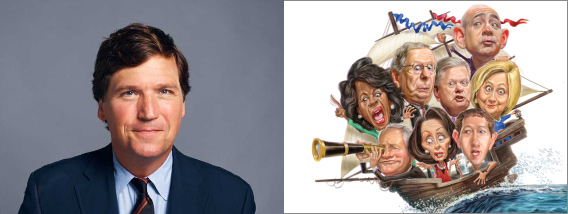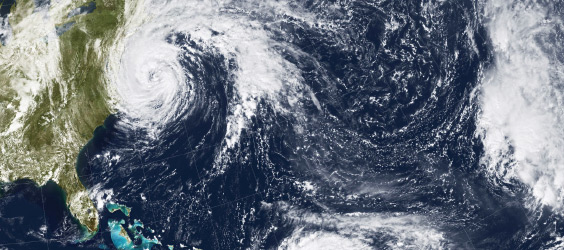The Lighthouse® is the weekly email newsletter of the Independent Institute.
Subscribe now, or browse Back Issues.
Volume 20, Issue 42: October 16, 2018
- Tucker Carlson: America versus the Political Class
- School Choice Gaining Ground
- Welcoming Venezuela’s Refugees
- Making Disasters Worse While Harming Taxpayers
- The Beacon: New Blog Posts

Today’s political polarization stems from a backlash against the entrenched elites and the manufactured consensus they’ve long championed from atop the culture’s commanding heights: Ordinary Americans are simply fed up with self-righteous elites for having stifled dissent on issues that matter—the economy, government, and war. This provocative thesis emanates not from left-wing gadflies like Noam Chomsky or Michael Moore, but from conservative pundit Tucker Carlson, who cheers on the populist revolt from the studios of the Fox News Channel and in his new bestseller, Ship of Fools: How a Selfish Ruling Class Is Bringing America to the Brink of Revolution.
Because the polarization runs so deep, standard political affiliations don’t provide a clear lens through which to view it, Carlson argues. “Left and right are no longer meaningful categories in America,” he writes, in an op-ed published in the San Francisco Chronicle. “The rift is between those who benefit from the status quo and those who don’t. That’s rarely acknowledged in public, which is convenient for those who are benefiting.”
Here’s something else also rarely acknowledged: The status quo opposing the populist rebellion is rife with authoritarians in waiting. If given the opportunity, they wouldn’t think twice about twisting the legal system to suit their own agenda and imposing censorship to ensure their propaganda goes unchallenged. Yet despite the consequences at stake, America would be better off if both sides in the conflict took a measured response: “Hopefully, it’ll be the kind of low-grade revolution where everybody learns something and nobody gets hurt,” Carlson writes. “But it will be wrenching either way, because revolutions always are.”
A Revolution Is Under Way in America, by Tucker Carlson (San Francisco Chronicle, 10/3/18)
An Evening with Tucker Carlson (Alameda, Calif., 10/16/18)
America’s Ruling Class—And the Perils of Revolution, by Angelo M. Codevilla (The American Spectator, 7/15/10)

The elites who run the National Education Association are out of touch: Most Americans favor school choice, and support is rising, according to a new poll by Education Next. “Not only has overall support for universal private-school options increased by 9 percentage points since 2017, bipartisan support has also increased,” writes Independent Institute Research Fellow Vicki E. Alger, in a recent op-ed for The Hill.
Support for publicly funded school choice is 54 percent, and support for privately funded tax-credit scholarships for low-income students is even stronger, with “58 percent of Republicans and Democrats, 61 percent of blacks, 62 percent of parents, and 68 percent of Hispanics,” Alger continues.
The writing is on the wall: School choice is coming in one form or another, and politicians would do better for their constituents (and themselves) by endorsing it. Alger recommends, however, that the federal government leave it to the states to implement. “Likewise, opponents of educational choice should come to grips with the fact that they’re not going to convince parents to return to the bad old days when bureaucrats picked their children’s schools based on their families’ zip codes,” Alger concludes.
Despite Crusade Against School Choice, Most Americans Are Still in Favor, by Vicki E. Alger (The Hill, 9/11/18)
Failure: The Federal Misedukation of America’s Children, by Vicki E. Alger
Customized Learning for California: Helping K–12 Students Thrive with Education Savings Accounts, by Vicki E. Alger

Venezuelan strongman Nicolás Maduro has destroyed his country’s economy, cracked down on civil rights, and sparked a mass exodus. “Four million Venezuelans live abroad, of whom 2.3 million have left in recent years due to the inhumane conditions at home,” writes Independent Institute Senior Fellow Alvaro Vargas Llosa, in an op-ed for the Wall Street Journal. How should other nations respond to the Western Hemisphere’s worst humanitarian crisis?
They should welcome the refugees and make it easier for them to assimilate into their economies, Vargas Llosa argues. Doing so would move the migrants beyond the border towns where the influx often strains local infrastructure. It would also enable host countries to better utilize the refugees’ labor skills. Most Latin American governments have already consented to helping refugees—at least in principle—via the 1984 Declaration of Cartagena. Unfortunately, some have become less hospitable toward Venezuelan refugees by demanding they have passports and police-record certificates or by turning them away.
The United States should also open its arms. “The mostly middle-class Venezuelans who have flown to Miami have largely managed to receive asylum, but they represent only a tiny fraction of those trapped in legal limbo in Latin America,” Vargas Llosa writes. “The liberal democracies of the Western Hemisphere should agree to share responsibility for the humanitarian casualties of Venezuela’s tyrant.”
Open the Door to Venezuelan Migrants, by Alvaro Vargas Llosa (The Wall Street Journal, 10/11/18)
Global Crossings: Immigration, Civilization, and America, by Alvaro Vargas Llosa

Hurricanes Michael and Florence have taken a heavy toll—but why aren’t people up in arms about federal policies that have encouraged homeowners and developers to build so many structures in harm’s way? It’s a problem as old as the policies themselves. This is why Independent Institute Research Fellow Adam B. Summers argues, in a piece for the Orange County Register, that we should reconsider the 50-year-old National Flood Insurance Program.
Congress tried to phase out federally subsidized flood insurance in 2012, but to no avail. Masses of policyholders exerted their political muscle, and lawmakers relented. The program is now deeper in debt than ever—to the tune of $20.5 billion.
Washington, DC, isn’t the only place where government puts taxpayers on the hook by encouraging construction in risky areas. Texas has a program that subsidizes wind insurance, and Hawaii has a program that encourages building in lava flow zones. “Supporters of these government-established insurance programs may think they are helping people by offering subsidized insurance, but it does not do them any favors to repeatedly encourage them to live in harm’s way,” Summers writes.
Stop Subsidizing Building in Flood—and Even Lava Flow—Zones, by Adam B. Summers (The Orange County Register, 9/26/18; Pasadena Star-News, 9/26/18; Los Angeles Daily News, 9/26/18)
Risky Business: Insurance Markets and Regulation, edited by Lawrence S. Powell
- How Does Your State Rank on Individual Taxes?, by Craig Eyermann
- When Healthy Policy Neglects Economic Principles, Patients Suffer, by Raymond March
- Proposition 47 Backstory to Mac Attacks?, by K. Lloyd Billingsley
- Will Justice Kavanaugh Roll Back Russian Influence?, by K. Lloyd Billingsley
- Trump’s Ethanol Plans Double Down on Bad Environmental Policy, by William Shughart
- Jerry Brown’s ATF, by K. Lloyd Billingsley






